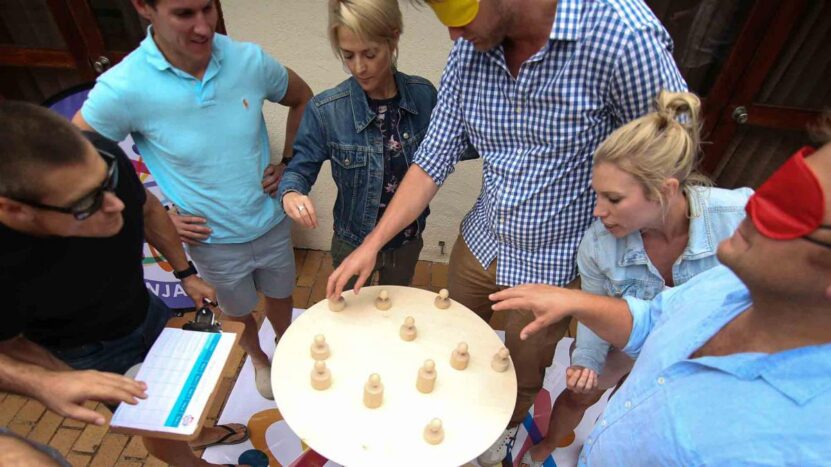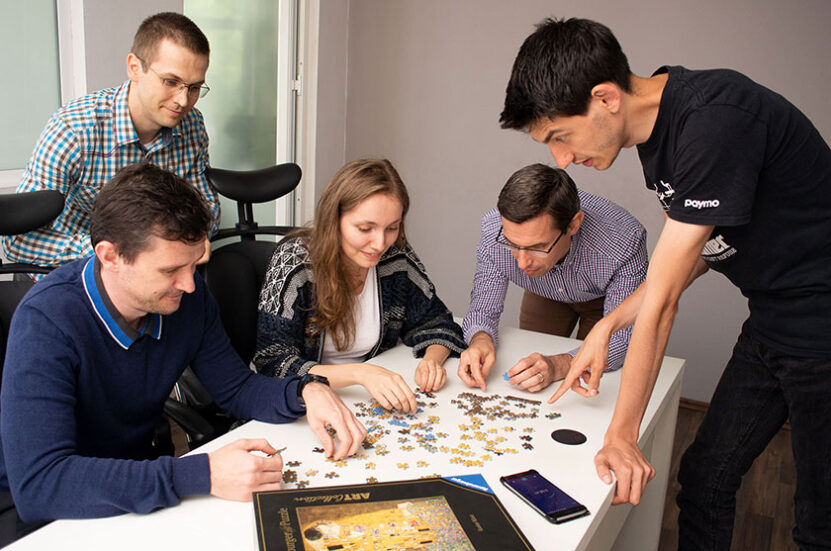Teams are the driving force behind all organizations. Teams aware of their role and its importance for the success of the company, among whose members there is trust and understanding, can achieve even the most demanding goals. If collaboration is impaired, productivity and motivation drop, dissatisfaction rises, and even basic tasks can seem impossible. That is why it is important to regularly work on improving cooperation between teams. In addition to everyday informal activities such as going on a break together or hanging out after work, it is important to plan time for team building. Time makes it clear how high-quality teamwork is an important aspect of the company’s business, and gives team members the opportunity to devote themselves to its development as much as possible.
Through various challenges, discussions and tasks, which often encourage thinking and behavior outside the usual framework, the team members have the opportunity to get to know each other better and to connect additionally. Systematically designed corporate team building activities you can find if you visit this site will encourage them to communicate, solve problems and make them aware of common goals and vision. This ensures mutual understanding and joint establishment of solid foundations for the long-term success of the team, which functions significantly better after team building.
It is a process aimed at creating effective activities and coordinated actions that promote team cooperation and skill development. These activities can include things as diverse as games, trust exercises, communication training and skills development workshops. The goal of these activities is for team members to work together, develop trust in each other, communicate openly and build a common vision.

How to conduct them?
The process of conducting team building can vary depending on the needs of the team and the organization. However, some general guidelines include:
Defining goals: Before conducting any joint activity, it is important to define goals and expectations for activities. Think about what you want to achieve through these activities, what problems you want to solve and what you want to achieve in the end.
Activity selection: There are several types of activities that can be used for this purpose, including sports games, trust exercises, communication training, and skills development workshops. Choose activities that align with your team’s goals and needs.
Planning and organization: After choosing an activity, it is important to plan and organize the event. This includes choosing a date, place and time, as well as preparing equipment and necessary materials.
Involvement of the team: Involvement of the team in the planning and organization of activities can be useful for achieving goals. This will also help build trust and a sense of community among team members.
Monitoring and evaluation: After the activity is over, it is important to monitor and evaluate the success of the team building. To include evaluation of goals and expectations, discussions with team members about their experience, and feedback on what can be improved in the future.

When is the right time to organize these activities?
If within the team you notice a low level of energy, destructive communication, inconsistency in goals or a lack of clarity regarding individual team roles, distribution of tasks and areas of responsibility, it is necessary to improve teamwork and strengthen mutual connection as soon as possible. But, keep in mind – team building is best organized when you don’t think you need it. Then additional empowerment and connection will motivate the team to realize their full potential and create additional value for the organization.

Examples of activities
- Team sports such asbasketball, basketball or soccer can be excellent for building team spirit and strengthening cooperation.
- Trust exercises such as “falling circle” or “crawling” can help develop trust and confidence among team members.
- Communication training can help develop skills such as listening, expressing and asking questions.
- Skills development workshops can help team members develop specific skills such as leadership, time management or creativity.
- Team challenges such as orienteering, puzzles or collecting food for charity can be fun ways to build team spirit and cooperation.
- Outings and activities outside the workplace like going rafting or hiking can help team members connect on a personal level outside of the work environment.
- A team lunch or dinner can be a great way to strengthen bonds between team members and create an informal atmosphere.
- Volunteering for a charity can be a great opportunity for a team to work together towards a goal and create a sense of achievement.
- Innovative activities such as hackathons, pitch competitions or designing applications can help develop creativity, collaboration and problem solving.

Finally, having a well-established, functioning team is very important!
Effective teams should have clearly defined goals and a strategy for achieving them. Each team member should have a clear role and responsibilities within the team, and the team should have a clear hierarchy and decision-making process. Team members should be motivated to achieve goals and be aware of their importance in achieving joint goals. However, building an effective team is not only about achieving goals, but also about creating a healthy work culture where all team members are involved, supported and motivated. A healthy work culture helps to maintain motivation and productivity in the long term.
When deciding on team building activities, it is important to consider the different ways people learn and respond to activities. Some people like to compete, while others prefer to work together. Different generations may also have different preferences for the type of activity.
Team building activities can help develop a healthy work culture and strengthen bonds between team members. If activities are organized in the right way, key skills such as communication, collaboration and problem solving can be improved.

